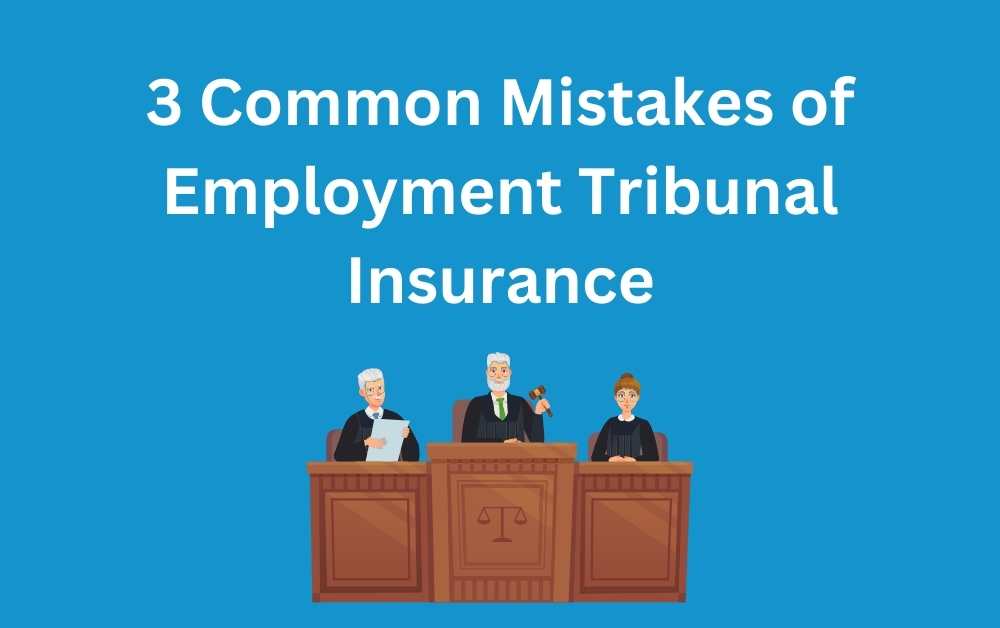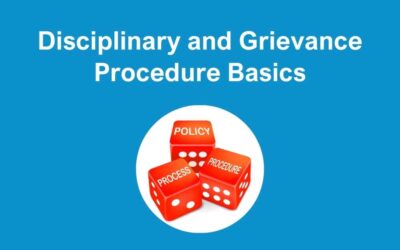Employment law is complex, with loopholes and potential liability, leaving employers scrambling for protection. This only benefits those in the tribunal insurance field because most businesses can’t afford the time, expense, and hassle of an employment tribunal. This means they sell more insurance because employers don’t want to consider the bad publicity or expense should something go wrong.
But what is employment tribunal insurance, and what are some of the most common mistakes employers make with it?
What is Employment Tribunal Insurance?
Employment tribunal insurance is more than just a legal expenses insurance. It can protect against tribunal claims from an employment dispute. This might mean that you carry insurance for all legal and compensatory costs arising from a tribunal claim to potentially just the legal cost of the tribunal.
The problem is that it’s difficult for most employers to quantify what a claim is worth. Because of this, many companies secure expensive tribunal insurance policies to ensure they’re covered if something does happen. A more significant problem is that many employers don’t need insurance or don’t need as much insurance if they have proper HR policies and procedures in place. Moreover, costs aren’t typically as expensive as most expect.
If you’re a small business owner, you might find this helpful.
Specific Advice for Small Businesses:
As a small business owner, you’re likely all too familiar with the distinct challenges of running a smaller enterprise. From tight budget constraints to having a modest HR team, navigating these hurdles can often feel like an uphill battle. But fear not because tailored advice directly addressing these challenges can make all the difference.
When it comes to budget constraints, every pound counts. Unlike larger corporations with hefty financial reserves, you have to be strategic about where you allocate your resources. This means prioritising initiatives that deliver maximum impact without breaking the bank.
Let’s not forget about your HR department—perhaps it’s just you or a small team wearing multiple hats. Juggling recruitment, training, and employee relations with limited manpower requires a special skill. But with the right guidance, you can streamline processes and make the most of what you have.
That’s where tailored advice tailored comes in. By understanding your unique circumstances and limitations, you can implement solutions that are both effective and affordable. Whether leveraging technology to automate tasks or providing targeted training for your HR team, personalised guidance can help you overcome obstacles and achieve sustainable growth.
Employment Tribunal Insurance Cost Analysis
Tribunal Insurance Costs: When considering tribunal insurance, consider factors like annual premiums. These can vary based on your business size, required coverage, and the insurer’s pricing. Providing specific examples or average premium figures gives you a concrete idea of what you might be paying.
Potential Tribunal Costs: Now, consider the expenses you might face if confronted with an employment tribunal claim. This could include legal fees by your appointed law firm, compensation payouts, and administrative costs. Real-world examples or average figures from past cases can help you grasp the potential financial impact.
- Solicitors’ consultation fees, case preparation, and representation during tribunal hearings can add up.
- Compensation Pay-outs: You could be liable for compensation if the tribunal rules against you. Examples of typical compensation amounts awarded in relevant cases can give you an idea of potential costs.
- Administrative Costs: Besides legal fees and compensation, additional administrative expenses exist, such as document preparation and tribunal fees.
Comparative Analysis: You can assess the financial implications by comparing the total cost of insurance premiums over time against potential expenses without insurance. This analysis should consider different scenarios and probabilities.
Risk Mitigation Benefits: Don’t forget the risk mitigation benefits of tribunal insurance. It provides financial protection against unexpected claims and grants access to legal expertise. This peace of mind lets you focus on your business without worrying about substantial financial losses.
Comparison of Employment Tribunal Insurance Providers
When assessing providers of employment tribunal insurance, there are four crucial factors to consider:
Coverage Comparison: You should evaluate the extent of coverage offered by different insurance providers or insurance brokers. This involves understanding the types of claims included in the policy, such as unfair dismissal or discrimination. Comparing coverage details ensures you choose a policy that adequately safeguards your business.
Cost Analysis: It’s essential to analyse the costs of tribunal insurance from various providers. This includes considering premiums, excess payments, and any additional fees. A thorough cost assessment will help determine each provider’s affordability and value.
Policy Features and Benefits: Explore the additional features and benefits of each provider’s tribunal insurance policies. This may include access to legal helplines, support with documentation, representation at tribunal hearings, and reimbursement of legal expenses. These features will help you understand the level of support each provider provides.
Customer Reputation and Reviews: Research each insurance provider’s reputation and customer reviews. Feedback from other businesses can offer valuable insights into the quality of service, responsiveness, and overall satisfaction with the provider. This information can assist you in determining the reliability and trustworthiness of potential insurers.
By considering these four factors – coverage comparison, cost analysis, policy features and benefits, and customer reputation and reviews – you can make a well-informed decision when selecting an employment tribunal insurance provider for your business.
Case Studies or Testimonials:
Indeed, here are four points elaborating on how real-life examples of businesses facing tribunals with or without insurance can illustrate the potential risks and benefits:
Learning from Past Experiences: By examining real-life cases, you can learn from the experiences of businesses facing tribunal claims. For example, understanding how a business without insurance struggled with legal fees and compensation pay-outs after losing a tribunal case highlights the risks of being unprepared.
Demonstrating the Value of Insurance Coverage: Case studies of businesses with insurance coverage during tribunal proceedings can demonstrate the practical benefits of being insured. For instance, a company that received comprehensive legal support and avoided significant financial losses due to its insurance policy showcases the value of proactive risk management.
Highlighting Financial Implications: Real-life examples provide tangible evidence of the financial implications of tribunal claims for businesses. For instance, comparing the costs incurred by a business without insurance to those covered by an insured business can illustrate the potential savings and risk mitigation benefits of having appropriate coverage.
Validating Provider Reputation: Sharing anecdotes of businesses’ experiences with specific insurance providers can validate or challenge their reputation and reliability. Positive experiences, such as timely assistance and effective legal representation, can enhance the credibility of reputable insurers. In contrast, negative experiences may raise concerns and prompt further investigation before selecting an insurance provider.
Detailed Steps to Improve HR Practices:
Develop Comprehensive Policies & Procedures: Create clear policies and procedures outlining employee and management expectations. These should cover areas such as discrimination, harassment, disciplinary procedures, grievance handling, and health and safety. Ensure that policies are effectively communicated to all employees and regularly reviewed and updated to stay compliant with current legislation.
Provide Ongoing Training and Development: Invest in regular training programs to educate employees and managers on their workplace rights, responsibilities, and obligations. Training topics should include diversity and inclusion, conflict resolution, performance management, and legal compliance. By ensuring employees understand company policies and the importance of fair treatment, businesses can prevent misunderstandings and disputes that may escalate to tribunals.
Maintain Detailed and Accurate Documentation: Keep meticulous records of all employment-related matters, including performance evaluations, disciplinary actions, attendance records, and any incidents or complaints. Accurate documentation is essential for complying with employment laws and defending against tribunal claims. Implement robust record-keeping systems and ensure that records are securely stored and readily accessible when needed.
By implementing these three steps and strategies, businesses can proactively mitigate the risk of facing employment tribunals and foster a fair, compliant, and harmonious work environment.
Legal Perspectives or Expert Insights:
Incorporating insights from legal experts specialised in employment law can provide invaluable depth to discussions surrounding tribunal insurance. Here’s how:
Expert Risk Analysis: Legal experts can assess businesses’ legal risks in employment matters. By pinpointing common pitfalls and emerging trends, they help businesses understand their exposure to tribunal claims, informing their decision-making regarding insurance coverage.
Policy Evaluation: These experts can review tribunal insurance policies to gauge their suitability in addressing legal risks. Their analysis identifies coverage gaps and ensures businesses select policies that effectively mitigate their legal exposure.
Tailored Risk Management Strategies: Legal specialists offer tailored advice on risk management. This includes updating policies, enhancing training, and implementing dispute-resolution mechanisms. By proactively addressing legal issues, businesses can reduce reliance on insurance and minimise tribunal risks.
Case Study Insights: Drawing on legal precedents, experts provide real-world examples of tribunal cases. Analysing these outcomes informs businesses about potential risks and benefits associated with insurance coverage, aiding their decision-making process.
Guide to Evaluating the Need for Insurance:
A comprehensive checklist or guide can empower business owners to assess their current risk level and determine the necessity of tribunal insurance for their specific situation. Here’s how such a resource could be structured:
Risk Assessment Checklist: Evaluate Current Policies and Procedures: Assess the adequacy of existing HR policies and procedures in mitigating legal risks, such as discrimination, harassment, and unfair dismissal.
Insurance Need Assessment Guide: Coverage Evaluation: Determine whether existing insurance policies, such as general liability or professional indemnity insurance, adequately cover employment-related risks or if additional tribunal insurance is necessary.
Decision-Making Framework: Establish Risk Tolerance: Define the business’s risk tolerance and appetite for potential legal disputes or tribunal claims, considering factors such as industry norms, business objectives, and financial constraints.
By providing business owners with a structured checklist or guide tailored to their specific needs and circumstances, they can make informed decisions about the necessity of tribunal insurance and develop effective risk management strategies to protect their business interests.
Information on Policy Limitations:
Exclusion & Limitations: Examine the policy’s exclusions to identify scenarios not covered, such as intentional acts or contractual disputes. Pay attention to limitations on coverage, like monetary caps for specific claims, which can impact the level of financial protection provided
Notification Requirements and Duty to Mitigate Loss: Understand any requirements for reporting claims within specified timeframes and the duty to mitigate losses. Failure to adhere to these requirements could lead to denied coverage, even if the claim is otherwise valid.
Renewal Terms and Dispute Resolution Mechanisms: Consider renewal terms, including changes in coverage or premiums, and ensure compliance with policy conditions. Additionally, understand the policy’s dispute resolution mechanisms to effectively address disagreements over coverage or claim settlements.
By understanding these common limitations and clauses, business owners can gain insight into their insurance coverage and make informed decisions about risk management strategies.
So, what are you supposed to do? The best advice is to familiarize yourself with the most common mistakes employers make to ensure you don’t make the same. Below, we detail three of the most common mistakes you may already make.
Mistake 1: You May Not Need Tribunal Insurance But are Still Paying for it
No one purchases insurance and fails to take measures to prevent using it. For example, if you had a facility by a river, you wouldn’t watch the flood without taking steps to protect your building. So, why shouldn’t the same logic apply to people in your workplace?
It’s essential to evaluate whether you actually need insurance before you decide to purchase it. Typically, it’s best to reform HR practices to protect yourself against tribunals before you resolve to purchase insurance to pay for it.
Mistake 2: Your Costs Aren’t All Covered
The cost and time spent handling a tribunal claim are more than substantial. And, while many companies pay for insurance to protect against such an occurrence, they’re surprised to find out when a tribunal claim proceeds that their insurance isn’t going to cover the entire amount.
Remember that your staff will also spend much time preparing for and handling the tribunal. More importantly, shared knowledge of the tribunal will likely impact employee morale and further diminish business operations.
It’s always best to turn to HR practices and solutions before assuming insurance is the best protection against tribunal costs.
Mistake 3: Assuming Insurance Companies Will Pay Because You Have Coverage
You purchase tribunal protection because you assume the insurance company will step in and pay when it is supposed to. However, this particular type of insurance has many “get out” clauses, meaning you may pay for your company to reject your claim.
Claims are most often invalidated if an employer doesn’t follow every rule accordingly. Consulting with an HR professional can help with this problem, but most HR consultants eliminate the need for insurance altogether.
Are You Making Tribunal Mistakes?
If you’re making any of the mistakes above, you’re throwing away money and giving your company a false sense of security where one doesn’t, or shouldn’t, exist. As such, you should choose a knowledgeable HR firm, like The HR Booth, to address underlying issues that diminish the need for tribunal insurance.
If you’re interested in learning more about tribunal insurance mistakes, have questions, or are interested in what our services entail, contact us on 01383 668178. We look forward to speaking with you and clearing up any lingering confusion on the topic.






